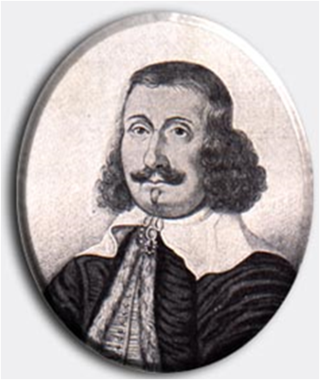Related Research Articles

Sir John Wildman was an English politician and soldier.

Colonel General Sydnam Poyntz, also Sydenham Poynts, was an English soldier who served in the Thirty Years' War and the English Civil War.

Francis Quarles was an English poet most notable for his emblem book entitled Emblems.

John Goodwin (1594–1665) was an English preacher, theologian and prolific author of significant books.

Henry Hastings, 1st Baron Loughborough, 28 September 1610 to 10 January 1667, was the younger son of Henry Hastings, 5th Earl of Huntingdon, one of the most powerful landowners in Leicestershire. He fought with the Royalist army in the Wars of the Three Kingdoms, and narrowly escaped execution after being captured at Colchester in 1648. He spent the next twelve years with the Stuart court in exile, and became a leading member of the Sealed Knot, a body set up to co-ordinate Royalist plots against The Protectorate. Hastings returned home after the 1660 Stuart Restoration, and was appointed Lord Lieutenant of Leicestershire in 1661, a position he retained until his death in January 1667.

Dennington is a village and civil parish in the English county of Suffolk. It is 2 miles (3.2 km) north of Framlingham and 15 miles (24 km) north-east of Ipswich in the east of the county. It lies along the A1120 road around 8 miles (13 km) west of the road's junction with the main A12 road in Yoxford.

Joseph Beaumont was an English clergyman, academic and poet.
Lazarus Seaman, was an English clergyman, supporter in the Westminster Assembly of the Presbyterian party, intruded Master of Peterhouse, Cambridge, and nonconformist minister.

Colonel Nathaniel Rich was a member of the landed gentry from Essex, who sided with Parliament during the Wars of the Three Kingdoms. He has been described as "an example of those pious Puritan gentlemen who were inspired by the ideals of the English Revolution".
George Leyburn was an English Catholic priest, who became President of the English College, Douai.

John Edwards (1637–1716) was an English Calvinistic divine.
Arthur Owen was a Welsh politician who sat in the House of Commons at various times between 1645 and 1678. He fought in the Parliamentary army in the English Civil War.
Edward Barber, was an English Baptist minister.
Samuel Eaton (1596?–1665) was an English Independent divine. He was a graduate from Magdalene College, Cambridge, and emigrated to the Thirteen British Colonies as a minister, following disagreements with Archbishop Laud. He was also a colleague of Puritan John Davenport, co-founder of New Haven Colony.
Sir John Goodricke, 1st Baronet was an English landowner and politician who sat in the House of Commons from 1661 to 1670. He supported the Royalist cause in the English Civil War.
Sir Edmund Rous, of Dunwich, Suffolk, was an English landowner, magistrate, MP and Vice-Treasurer of Ireland.
John Frescheville, 1st Baron Frescheville was an English soldier, landowner and politician who sat in the House of Commons at various times between 1628 and 1665 when he was created a peer and then sat in the House of Lords.
Thomas Warmestry was Dean of Worcester from 1661 until his death.
Richard Watson was a Church of England clergyman, Royalist divine, controversialist, and poet.

Nehemiah Rogers was an English cleric.
References
- 1 2 3 McElligott, Jason. "Gatford, Lionel (d. 1665)". Oxford Dictionary of National Biography (online ed.). Oxford University Press. doi:10.1093/ref:odnb/10450.(Subscription or UK public library membership required.)
- ↑ "Gatford, Lionel (GTFT618L)". A Cambridge Alumni Database. University of Cambridge.
- ↑ Gatford to Lord Goring, 22 July 1633. Calendar of State Papers, Dom. 1633–4, pp. 150, 279.
- ↑ Venn and the ODNB agree on this date against the DNB, which gave 1637.
- ↑ Commons' Journals, ii. 95.
- ↑ Commons' Journals, iii. 153.
- 1 2 3 4 5 Goodwin, Gordon (1890). . In Stephen, Leslie (ed.). Dictionary of National Biography . Vol. 21. London: Smith, Elder & Co. pp. 65–6.
- ↑ Cal. State Papers, Dom. 1661–2, p. 65
- ↑ · Calendar of the Clarendon state papers preserved in the Bodleian Library, ed. O. Ogle and others, 5 vols. (1869–1970), i. 271–2.
- ↑ Cal. State Papers, i. 316, 368, 416, ii. 19
- ↑ Jason McElligott, Royalism, print and censorship in revolutionary England, Boydell Press, 2007, p.34
- ↑ Cal. State Papers, Dom. 1661–2, pp. 65, 68.
- ↑ Rowe, Parish and Vicars of St. Andrew, Plymouth, p. 39.
- ↑ Palmer, Continuation of Manship, ii. 174–6; Perlustration of Great Yarmouth, iii. 10.
- ↑ Walker, Sufferings of the Clergy, pt. ii. p. 255.
- ↑ Ralph Winterton, Hippocratis Magni Aphorismi Soluti et Metrici, 8vo, Cambridge, 1633, p.20
- Attribution
![]() This article incorporates text from a publication now in the public domain : Goodwin, Gordon (1890). "Gatford, Lionel". In Stephen, Leslie (ed.). Dictionary of National Biography . Vol. 21. London: Smith, Elder & Co. pp. 65–6.
This article incorporates text from a publication now in the public domain : Goodwin, Gordon (1890). "Gatford, Lionel". In Stephen, Leslie (ed.). Dictionary of National Biography . Vol. 21. London: Smith, Elder & Co. pp. 65–6.